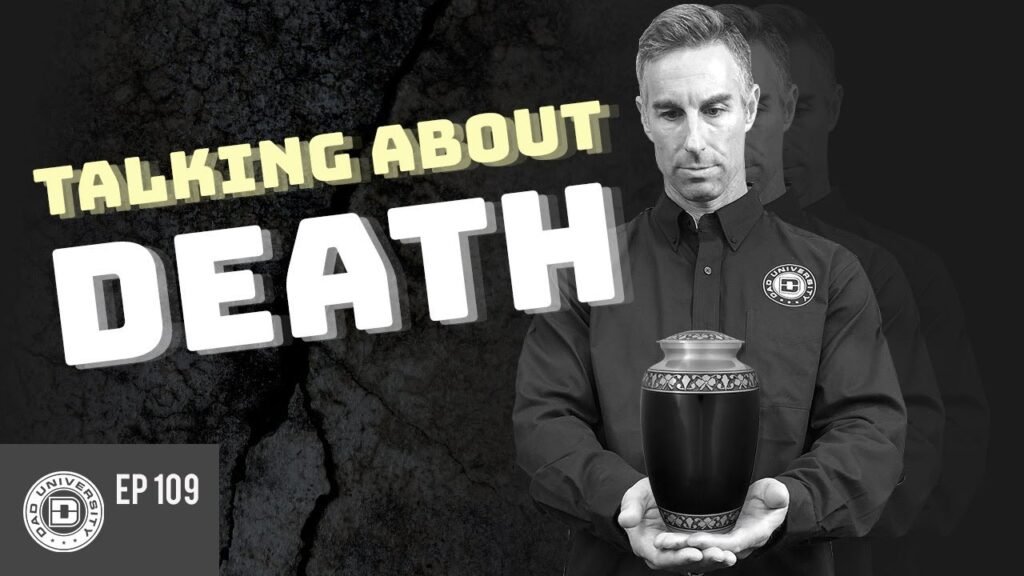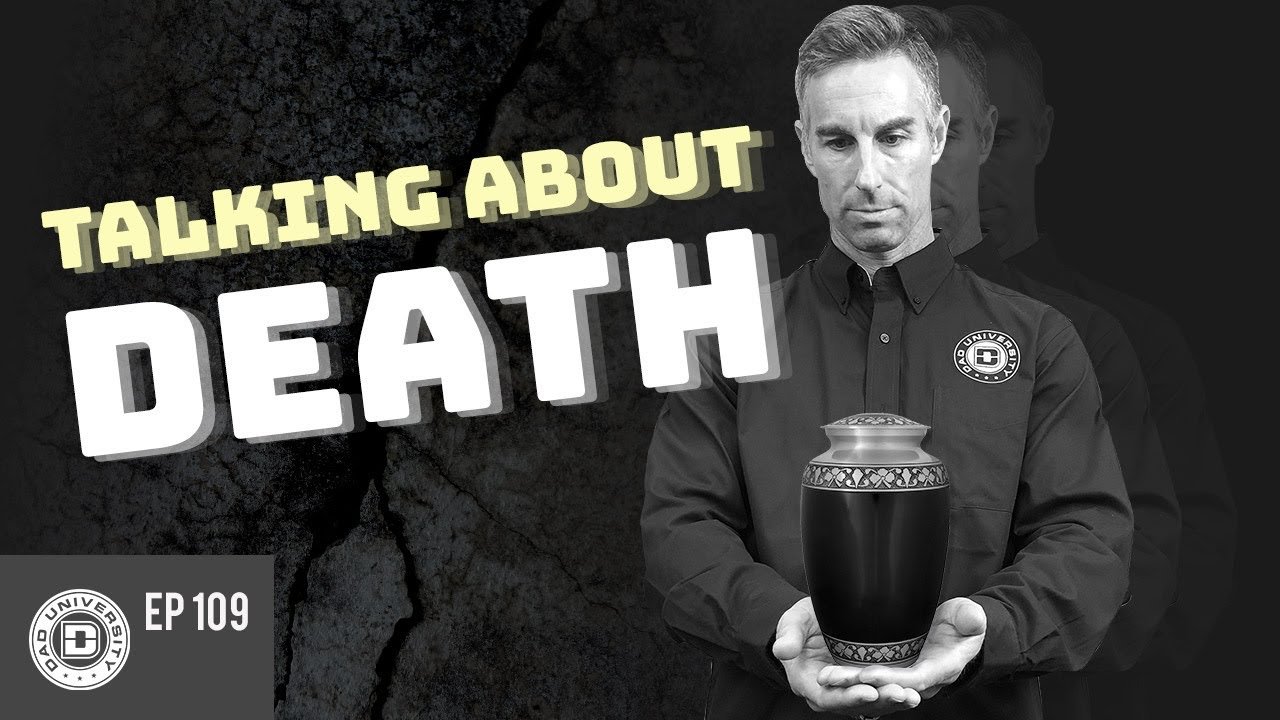Talking to your kids about death is a difficult and uncomfortable conversation that many parents try to avoid. However, it is a necessary discussion to have as it helps children understand and cope with the concept of death. Jason, the creator of Dad University, experienced his own grief when his mother passed away while his kids were young. He realized the importance of being honest with his children and allowing them to witness his own grieving process. In this video, Jason shares tips on how to talk to your kids about death, emphasizing the need for honesty, empathy, and inclusion in discussions surrounding death. By opening up this conversation, you can provide your children with the opportunity to have meaningful and honest conversations about this difficult topic.

Tip 1: Be Honest
Don’t hide the fact of the death from your children
Losing a loved one is a difficult experience, and it can be tempting to shield our children from the reality of death. But it’s important to be honest and open with them. Children are perceptive and can sense when something is wrong or different. By being honest about the death, you give your child the opportunity to understand and process their emotions.
Use age-appropriate language to explain what happened
When talking to your children about death, it’s crucial to use language that they can understand. Young children may not grasp the concept of death fully, so using simple and concrete explanations can be helpful. Avoid using euphemisms or vague language, as it may confuse or scare your child. Instead, provide clear and age-appropriate explanations that they can comprehend.
Tip 2: Be Empathetic
Put yourself in your child’s shoes
It’s essential to try to understand the situation from your child’s perspective. Each child may have a unique relationship with the deceased, and they may have varying levels of comprehension and emotional connection. By putting yourself in their shoes, you can better empathize with their experience and provide the support and understanding they need.
Consider their unique relationship with the deceased
Take into account how your child knew the person who died and the impact the loss may have on them. For example, if the deceased was a beloved grandparent or a close family friend, the child may have had a special bond and will likely experience a deeper sense of loss. Recognizing and acknowledging this unique relationship can help you tailor your approach to discussing death with your child.
Tip 3: Use the Word “Death”
Avoid using euphemisms such as “passing away”
While it may seem easier to use gentle language or euphemisms when talking about death, it’s crucial to use the word itself. Using terms like “passing away” or “gone to sleep forever” might create confusion or fear for your child. By using the word “death,” you provide clarity and a concrete understanding of the situation.
Explain the concept of death clearly and directly
When explaining death to your child, it’s important to be clear and direct. Use simple language to describe that death means a person’s body stops working, they stop breathing, and they can’t come back. Allow your child to ask questions and provide further explanations if needed. By being straightforward, you can help your child understand the finality of death.
Tip 4: Allow Yourself to Grieve
Give yourself permission to experience and express your emotions
As a parent, it’s natural to want to be strong for your children and shield them from your own grief. However, it’s crucial to give yourself permission to grieve. Losing someone you love is an incredibly challenging experience, and it’s essential to allow yourself to feel and express your emotions. By showing your children that it’s okay to grieve, you create an environment that encourages open and honest conversations about death.
Avoid self-judgment for your reactions or feelings
Grief is a deeply personal process, and everyone experiences it differently. It’s essential to avoid self-judgment or criticism for your reactions or feelings. Whether you find yourself crying, feeling angry, or feeling numb, remember that these reactions are normal and valid. By being gentle with yourself, you can navigate the grieving process and be a supportive presence for your children.
Tip 5: Let Your Children See Your Emotions
Model healthy expression of grief for your children
Children learn by observing, and they look up to their parents as role models. By allowing your children to see your emotions and the way you handle grief, you can model healthy expression and coping mechanisms. If you feel sad or need to cry, let your children see that it’s okay to show emotions and that it’s a natural part of the grieving process.
Answer their questions honestly about your emotions
Children may be curious about why you’re feeling sad or why you’re crying. When they inquire about your emotions, be honest with them. Explain that you’re feeling sad because you miss the person who died, and it’s a normal reaction to loss. By answering their questions honestly, you validate their own emotions and provide an opportunity for them to understand and express their feelings.
Tip 6: Be Inclusive
Include your children in funeral arrangements and family gatherings
When a death occurs, there are often funeral arrangements and family gatherings that take place. Including your children in these activities can help them feel involved and part of the grieving process. They may have questions about the rituals or want to participate in remembering the person who died. By including them, you can provide them with a sense of belonging and support.
Help them feel a part of the grieving process
Grief is a collective experience that affects the entire family. Help your children feel like active participants in the grieving process by involving them in memorial activities or creating rituals to remember the person who died. Whether it’s lighting a candle or planting a tree in their memory, these actions can provide a sense of comfort and help your children feel connected to their loved one.
Tip 7: Let the Child Lead the Discussion
Encourage your child to ask questions
Children have a natural curiosity and may have questions about death. Encourage your child to ask questions and let them know that it’s okay to wonder and seek understanding. By creating a safe space for dialogue, you can address their concerns and provide age-appropriate answers to their inquiries.
Provide honest answers that are age-appropriate
When responding to your child’s questions, be honest while considering their age and level of understanding. Avoid overwhelming them with unnecessary details or information that might be too difficult for them to comprehend. Instead, provide honest and age-appropriate explanations that address their curiosity while being sensitive to their emotional needs.
Tip 8: Seek Support from Grief Counselors or Support Groups
Discussing death can be challenging, seek professional help if needed
Talking to your children about death may be emotionally challenging for you as a parent. If you find yourself struggling or needing additional support, consider seeking help from grief counselors or support groups. These professionals can provide guidance, tools, and resources to navigate the difficult conversations and emotions that come with discussing death.
Find resources that can provide guidance and support
In addition to professional help, there are numerous resources available to assist you in talking to your children about death. Books, online articles, and community organizations offer valuable insights and guidance on how to approach this sensitive topic. Take advantage of these resources to gain a better understanding of how to support your children in their grief journey.
Tip 9: Normalize Grief
Help your child understand that grief is a normal process
Grief is a natural response to loss, and it’s important for your child to understand that their feelings of sadness, anger, or confusion are normal. Explain to them that grief is a process that everyone goes through when they lose someone they love. Normalize their emotions and reassure them that it’s okay to feel a range of emotions during this difficult time.
Assure them that it’s okay to feel a range of emotions
Children may experience a wide range of emotions when dealing with death. Assure them that it’s normal to feel sad, angry, or even happy at times when remembering the person who died. Emphasize that there’s no right or wrong way to grieve and that their feelings are valid. Encourage them to express their emotions and provide a supportive environment for them to do so.
Tip 10: Encourage Remembrance and Celebration of Life
Create rituals to honor the deceased
Remembering and celebrating the life of the person who died can be a healing and comforting experience for both you and your children. Create rituals or traditions that allow you to honor their memory. This can include lighting candles, looking at photo albums, or sharing stories about the person who has died. By incorporating these practices into your lives, you keep their memory alive and provide a space for your children to find solace and comfort.
Share memories and stories about the person who has died
Encourage your children to share their memories and stories about the person who has died. Talking about their loved one and sharing happy moments or funny anecdotes can help keep their memory alive. By sharing these stories, you create a space for your children to feel connected to the person who died and find comfort in their cherished memories.
Discussing death with your children is never easy, but it’s a necessary conversation to help them understand and navigate the grieving process. By being honest, empathetic, and inclusive, you can create an open and supportive environment for your child to express their emotions and find comfort in the face of loss. Remember to seek support if needed and embrace the opportunity to remember and celebrate the life of the person who has died.

